Follow Your Different
121 Secrets of Sand Hill Road Venture Capital, w/ Scott Kupor Managing Partner, Andreessen Horowitz
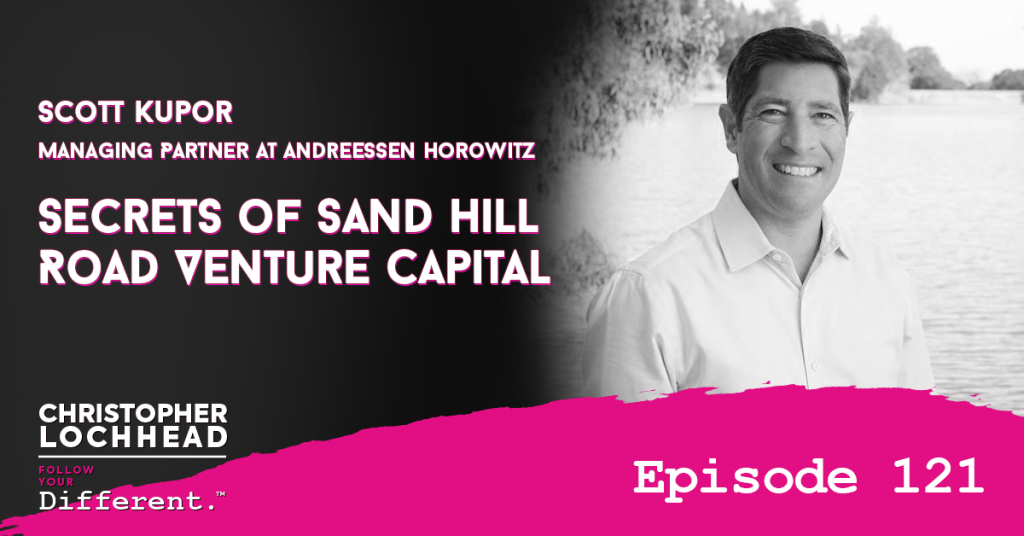
Podcast: Play in new window | Download (Duration: 1:01:29 — 84.5MB) | Embed
Subscribe: Apple Podcasts | Spotify | Pandora | RSS | More
In another riveting episode, Scott Kupor, the managing partner of one of the highest-profile VC on the planet over the last decade, Andreessen Horowitz, joins us today to discuss startups, how to get funded and a lot more! He is also the author of the book called Secrets of Sand Hill Road: Venture Capital and How to Get It.“Inside Baseball”
Scott addressed the common issue of “inside baseball” between entrepreneurs and VCs. He shares that there is no reason why questions shouldn’t be answered and that VCs should reach out to entrepreneurs.“People don’t understand why decisions are made. I think that just leads to mistrust quite frankly between VCs and entrepreneurs.” – Scott KuporMoreover, Scott shares the reason why he wrote the book. He wanted to bridge the gap between VCs and entrepreneurs. Through this book, he answers several entrepreneur questions that previously were assumed to be understood, since they have done a lot of deals in the past.
Information Asymmetry
Scott discusses the idea about information asymmetry and how it results to one party benefitting at the expense of the other in those types of scenarios.“Capital is scarce and VCs have it. There was definitely a very different balance of power between entrepreneurs and VCs. There’s probably less incentive quite frankly for the VC. The biggest change, I think, in the last 10 yrs is, its as competitive as its ever been.” – Scott KuporMoney clearly a commodity in this business. For Scott, if VCs and entrepreneurs can level the playing field, he would enter into a relationship on a basis of actually understanding one another, knowing what motivates one another as it would definitely be a good place better place to start.
More From Scott
Aside from talking about Silicon Valley, Startups and how entrepreneurs could get funding, he shares his thoughts on the overall VC backed industry.“My personal view is—I’ve talked about this with people in DC publicly—the idea that more and more growth is happening in the private markets, while beneficial, selfishly for people like me, who get to, kind of monetize that growth. I don’t think its good for the country. I don’t think its good to not have companies going public at a reasonable stage where a broader cross-section of public market investors can actually enjoy the appreciation there.” – Scott KuporTo hear more about Secrets of Sand Hill Road Venture Capital and more information about Scott Kupor, Managing Partner at Andreessen Horowitz, download and listen to the episode.
Bio:
Scott Kupor is the managing partner at Andreessen Horowitz where he is responsible for all operational aspects of running the firm. He has been with the firm since its inception in 2009 and has overseen its rapid growth, from three employees to 150+ and from $300 million in assets under management to more than $10 billion. Prior to joining Andreessen Horowitz, Scott worked as vice president and general manager of Software-as-a-Service at Hewlett Packard. Scott joined HP in 2007 as part of the Opsware acquisition, where he was senior vice president of Customer Solutions. In this role, he had global responsibility for customer interaction, including professional services, technical pre-sales, and customer support. Scott joined Opsware shortly after the company’s founding and held numerous executive management positions including vice president, financial planning and vice president, corporate development. In these roles, he led the company’s private financing activities as well as its initial public offering in 2001. Scott also started the company’s Asia Pacific operations and led the execution of the company’s multiple acquisitions. Prior to Opsware, Scott represented software companies in both financing and mergers and acquisitions transactions at Credit Suisse First Boston and Lehman Brothers. He graduated Phi Beta Kappa from Stanford University with a bachelor’s degree in public policy with honors and distinction. Scott also holds a law degree with distinction from Stanford University and is a member of the State Bar of California. Scott is chairman of the board of Genesys Works; cofounder and co-director of the Stanford Venture Capital Director’s College; co-founder and co-director of the Stanford Rock Center’s Guide to Venture-Backed Board Membership; Executive in Residence at Haas School of Business and Boalt School of Law; and a Lecturer at Stanford Law School. He is vice-chair of the investment committee of St. Jude’s Children’s Cancer Research Hospital and also serves as a member of the investment committees for Stanford Medical Center, the Silicon Valley Community Foundation, and Lick Wilmerding High School. Scott served as Chairman of the Board of the National Venture Capital Association (2017-2018). He is the author of the national bestselling book Secrets of Sand Hill Road: Venture Capital and How to Get It, published by Portfolio, a division of Penguin.Links:
Linkedin: Scott Kupor Twitter: @skupor Podcast: a16z We hope you enjoyed this episode of Follow Your Different™! Christopher loves hearing from his listeners. Feel free to email him, connect on Facebook, Twitter, Instagram and subscribe on iTunes! Get amazing, different stories on business, marketing, and life. Subscribe to our newsletter The Difference.120 Security, Deep Fakes & Apple Glasses Oh My! w/ Dave Bittner
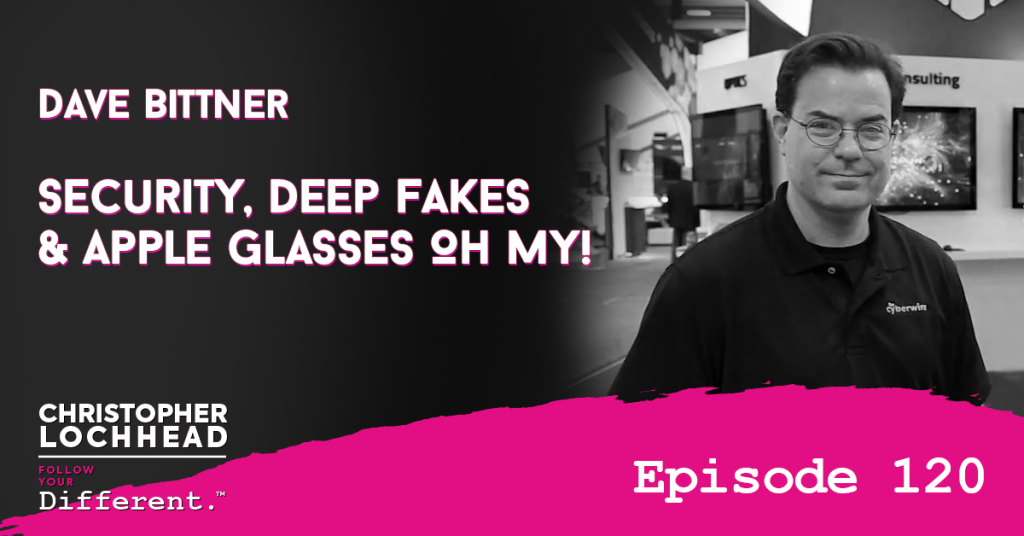
Podcast: Play in new window | Download (Duration: 1:02:46 — 86.2MB) | Embed
Subscribe: Apple Podcasts | Spotify | Pandora | RSS | More
Today, Dave Bittner, Producer and Host of The CyberWire Podcast and Hacking Humans podcast, joins us for a timely discussion about security, the future, deep fakes Apple glasses and more. He is a regular guest of podcast Grumpy Old Geeks with previous guests, Jason DiFillipo & Brian Schulmister.
Trade-Off Between Operations and Risks
Security has played a huge role in every technology company nowadays. The episode starts off with a very timely topic on security. Christopher poses the question “why security is hard?” Dave honestly answers that there is a trade-off and risk-reward decision-making process that needs to happen.
Dave continues that breaches started getting bigger as well as ramifications and costs resulting in bad publicity, too. Board Members now have started giving their attention to security threats, as they, themselves can be liable for these breaches.
“I think these days good board members have to have a certain level of knowledge and education in cybersecurity because it touches everything.” – Dave Bittner
More on Data Breaches and Hacking
Would there be more data breaches and hacking in the near future since the cost of technological equipment is getting cheaper? Dave answered, yes.
Hackers are professionalizing themselves. They also have access to knowledge and tools that enables them to target victims, as opposed to the usual shotgun approach.
“I think there are a few things going on right now, I think we are seeing the sophistication of the actors increased in the sense that, there’s an increase in the professionalism of them.” – Dave Bittner
Other Future Related Topics
Dave shares more about privacy and security. Also there’s the fact that 60% of people in the US genetic connections can be implied from data available from 23andme or Ancestry.com.
“The security implication is that biometric data—your DNA, your fingerprints, your face ID, facial recognition—those are the things that it’s very difficult to change, if not, impossible to change. If someone gets a hold of that and that something, that you’re using as a factor for your security, you cant just go reset that. That’s one of the long term concerns.” – Dave Bittner
To hear more about Security, Deep Fakes and Apple Glasses and more information about Dave, download and listen to the episode.
Bio:
Dave Bittner is the Producer and Host of The CyberWire Podcast, Hacking Humans podcast.
Links:
Survey: Most Data Center Managers Rely on Outdated Security Practices
Internet Companies Prepare to Fight the ‘Deepfake’ Future
We hope you enjoyed this episode of Follow Your Different™! Christopher loves hearing from his listeners. Feel free to email him, connect on Facebook, Twitter, Instagram and subscribe on iTunes! Get amazing, different stories on business, marketing, and life. Subscribe to our newsletter The Difference.
119 From Experiences To Transformations w/ Joe Pine
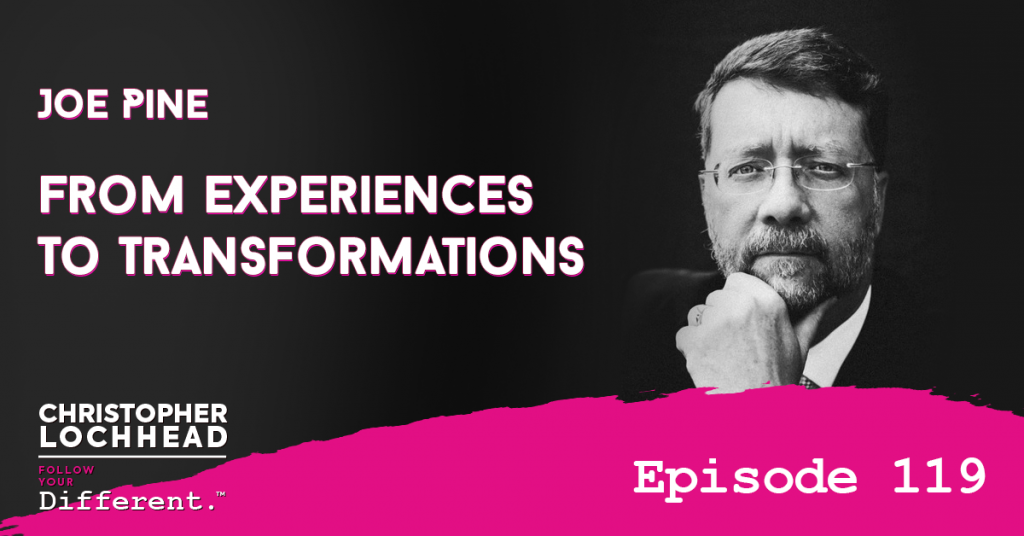
Podcast: Play in new window | Download (Duration: 55:33 — 76.3MB) | Embed
Subscribe: Apple Podcasts | Spotify | Pandora | RSS | More
We continue our run of legendary authors and today, we hang out with one of the smartest people in business, Joe Pine, one of the godfathers of “The Experience Economy.” It’s the 20th anniversary of his seminal work and he is reissuing an updated version of the book
In this episode, we dig deep into the future of experiences and how companies use it to differentiate and create massive competitive advantage. Pay special attention to Joe’s radical insights around building a data flywheel and the big strategic difference between Facebook and Amazon.
From UI to UX
Joe Pine shares with us about the re-release of The Experience Economy, bearing a new preview, that he and his partner wrote. They focused on the subtitle: Competing for Customer Time, Attention and Money. Companies embraced the importance of user interface in the past and now, user experience, or UX.
“When the first book came out, we talked about it as a nascent, an emerging, a forthcoming experience economy and now, we say it’s here. It’s all around us. I used to have to argue with people that this was happening. Now, I just say it: people want experiences. People now say, ‘yeah I get it.’” – Joe Pine
Further, Joe shared how the internet was at infancy back then. The www was just created in 1994 and in 1999, they didn’t have much to say about it. However, later over time, Joe shares they looked at it thoroughly and found the reason why people were on the internet was to surf the web—to have the experience of things that they couldn’t have otherwise.
Data Flywheel
Christopher shares his insights on how companies achieve category domination today. He shares that a big part of their strategy is getting their data flywheel spinning.
“The data flywheel is a learning relationship. If you cultivate a learning relationship, it grows and deepens over time. You can almost lock your competitors out because you know more about these customers than they do. Even if they switch, they have to teach them all over again what you already know.” – Joe Pine
Data Privacy
Further, in the discussion, Christopher remarks about how other companies cannot replicate the “data on customer-intimacy” that Amazon has with its customers. Joe agrees with Christopher as Amazon has yet to sell data to anybody, as they want to use it themselves at the moment.
“From an authenticity standpoint, that corrodes them [Facebook and Apple] from the inside out, because they are selling your data. They’re in it for the data, to sell to somebody else, rather than in it, for your best interest.” – Joe Pine
To hear more about the co-author of “The Experience Economy” Joe Pine, download and listen to the episode.
Bio:
Co-author of The Experience Economy, Joseph Pine II is an internationally acclaimed author, speaker, and management advisor to Fortune 500 companies and entrepreneurial start-ups alike.
In 1999, Joe and his partner James H. Gilmore wrote the best-selling book The Experience Economy: Work is a Theatre & Every Business a Stage, which demonstrates how goods and services are no longer enough; what companies must offer today are experiences – memorable events that engage each customer in an inherently personal way.
In 2011, The Experience Economy came out for the first time in paperback as an Updated Edition with new ideas, new frameworks, and many, many new exemplars. Each of Mr. Pine’s publications add a wealth of knowledge and experience to the business world, but The Experience Economy has become a quintessential read.
Mr. Pine also co-wrote Infinite Possibility: Creating Customer Value on the Digital Frontier with Kim Korn, Authenticity: What Consumers Really Want with Mr. Gilmore, and in 1993 published his first book, the award-winning Mass Customization: The New Frontier in Business Competition.
Each book details Mr. Pine’s breakthrough thinking as he has accurately charted many structural shifts — from individualizing goods to today’s focus on customer experiences and many other changes in the economy and consumer sensibility.
The economic competitive reality of the future is fast-paced change. Mr. Pine helps clients design strategies to leverage these new economic opportunities and create experiences that drive revenue.
Since revolutionizing the way we should approach and think about business with The Experience Economy, Joseph Pine has continued to be at the forefront as a thought leader. In his speaking and teaching activities, Mr. Pine has addressed the World Economic Forum, the original TED conference, and the Consumer Electronics Show.
A former Visiting Scholar with the MIT Design Lab, he is currently a Lecturer with the Columbia University School of Professional Studies, and has also taught at Penn State, Duke Corporate Education, the University of Minnesota, UCLA’s Anderson Graduate School of Management, and the Harvard Design School.
He serves on the editorial boards of Strategy & Leadership and Strategic Direction and is a Senior Fellow with both the Design Futures Council and the European Centre for the Experience Economy, which he co-founded.
Mr. Pine’s experiences prior to co-founding Strategic Horizons include holding a variety of technical and managerial positions with IBM.
Links:
We hope you enjoyed this episode of Follow Your Different™! Christopher loves hearing from his listeners. Feel free to email him, connect on Facebook, Twitter, Instagram and subscribe on iTunes! Get amazing, different stories on business, marketing, and life. Subscribe to our newsletter The Difference.
118 Why Are We Yelling w/ Buster Benson
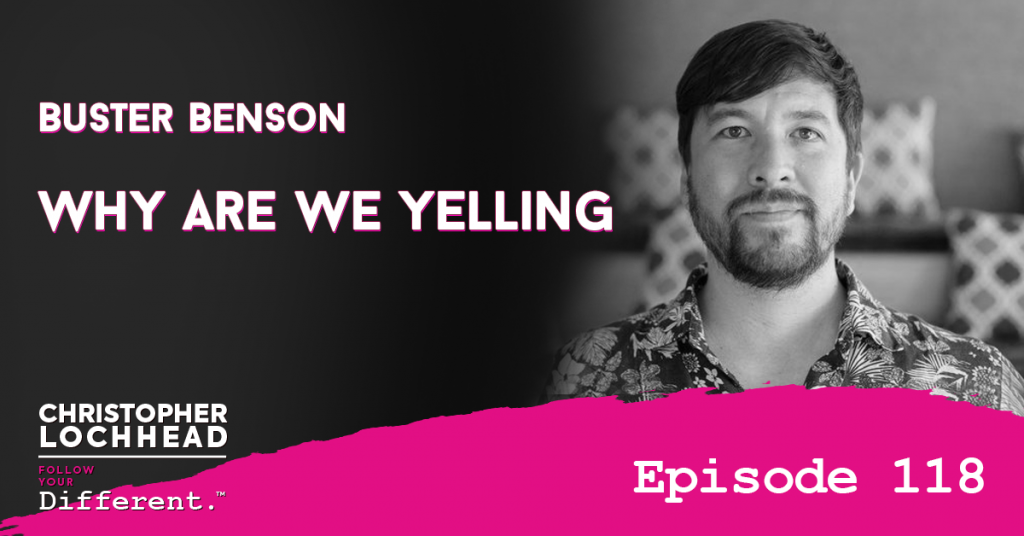
Podcast: Play in new window | Download (Duration: 52:31 — 72.1MB) | Embed
Subscribe: Apple Podcasts | Spotify | Pandora | RSS | More
In this episode, we continue our run of legendary authors as we feature Buster Benson and his new book, “Why are we yelling?: A fascinating look at why and who we argue.” Buster shares with us the inspiration of his book, the constant-learning that he is having and how it can be applied to work and life, in general.
Agree to Disagree
Buster candidly shared with Christopher that of all the hard topics he decided to take on, it was the topic about disagreements that he deemed to be one of the hardest. He still pursued this topic as he was challenged to tackle this topic. He also admits that the inspiration for the book was his curiosity on cognitive bias.
“That is the initial problem. in order to have a conversation about disagreement, we have to be open to the idea that we don’t have the right answer.” – Buster Benson
Birds and Biases
Buster shares that cognitive bias is an evolutionary term. It is a threat that could potentially lower our survival. It has the connotation that if we’re wrong, we would want to avoid it. In modern society, being wrong leads to being ousted from a certain group.
To illustrate this, Buster shared the habits of birds looking for a nesting ground. These birds fight off other birds and other animals to have authority over a tree. In real life, human beings as a bird, are not going to engage other “birds” in civil disagreement.
“You’re going to just try to be the bigger bird and force the other one out. When we’re no longer in a situation and there’s only one tree and we have to have a nest here, or else we’re gonna die, we ask, is this tree big enough for multiple birds?” – Buster Benson
Growth is the Consequence
The consequence of being wrong is actually growth. Further, Buster shares that if we are good at several skills, it makes us more skilled at everything else. For example: talking, being literate, being able to self reflect magnifies the value of other skills. He introduces the importance of productive disagreement as well in this episode.
“‘How do I treat somebody that is normally a threat to my survival, as an opportunity for growth’ is the core cognitive dissonance in disagreement.” – Buster Benson
To hear more about the author of “Why are we yelling?” Buster Benson, download and listen to the episode.
Bio:
Buster Benson wrote the book titled “Why Are We Yelling? The Art of Productive Disagreement”. He also run 750words.com with my wife.
His interests include creative businesses, collaborative disagreements, cognitive biases, enterprise software, messaging platforms, behavior change, social games, silly drawings, making life a little bit better through technology.
Read more about his through this link.
Links:
We hope you enjoyed this episode of Follow Your Different™! Christopher loves hearing from his listeners. Feel free to email him, connect on Facebook, Twitter, Instagram and subscribe on iTunes! Get amazing, different stories on business, marketing, and life. Subscribe to our newsletter The Difference.
117 What School Could Be w/ Ted Dintersmith
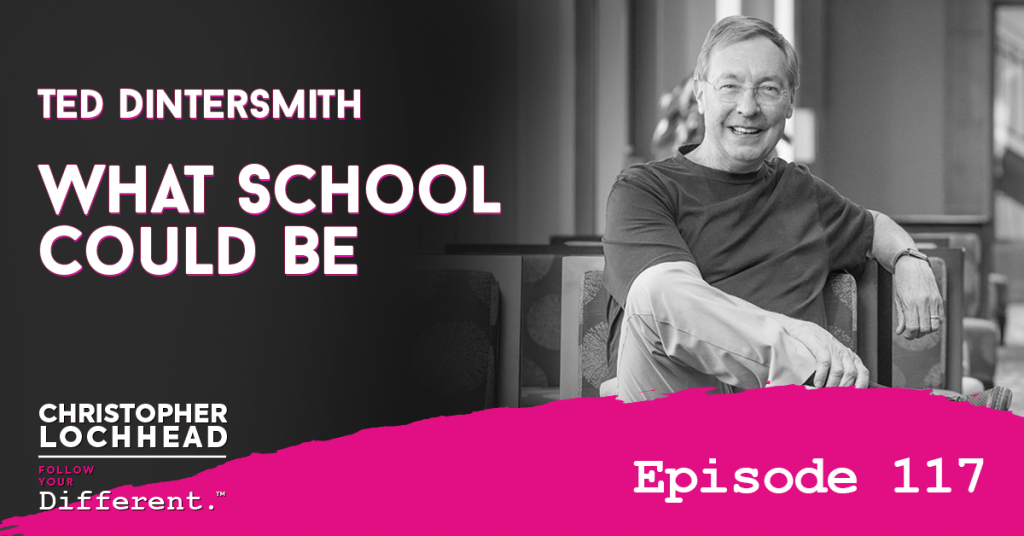
Podcast: Play in new window | Download (Duration: 1:24:45 — 116.4MB) | Embed
Subscribe: Apple Podcasts | Spotify | Pandora | RSS | More
We continue our run of legendary VCs and legendary authors like our guest for today, Ted Dintersmith. He’s a former top tech VC and he’s the author of the book What School Could Be: Insights and Inspiration from Teachers Across America. This is a powerful look at what’s possible in education from a smart, committed, super thoughtful guy.What School Could Be
Ted Dintersmith went to all fifty states, visiting some 200 schools and spoke to different school personnel and students. He says he was stunned by the innovative classrooms and schools he found across the USA. However, he also talked about schools who he described as good in paper, but not as good in reality.“There were so many schools like that, where on paper, it looks likes the kids are doing really well. Good grades, good test scores, reasonable to good College placements. The point I make is that I think these kids, are not really being helped in terms of being prepared for a world defined and shaped by innovation. They’re actually being impaired.” – Ted Dintersmith
Shifting Mindsets
Ted shares his conversations with school teachers, administrators and students shifted his thinking. He further says that the measure of success in so many schools is aligned with a few narrow capabilities. He questioned the schools, asking if he puts a kid in their school who excelled at memorizing material, replicating low-level procedures and following instructions, he bets that kid would be on the honor roll.“SAT tutors say, ‘don’t be creative when you take this test. Don’t think of unusual ways to answer it. Think clearly, simply and formulaically. The 2nd thing is, if it’s hard and it’s going to take a while to figure it out, skip it.’ Is that a great message for the kids?” – Ted Dintersmith
Education is a Pie Eating Contest
Ted continues to share with Christopher his insights that many kids are being told that they’re not gifted because they don’t match up to those narrow skills. Christopher also remarked in an overly simplistic form, that education nowadays is like a “Pie Eating Content” where you jam everything, regardless of what kind of pie it is, and know that the more you take, the better.“It’s crazy. We organize most of education around what’s easy to test and not what’s important to learn.” – Ted DintersmithTo hear more about how to encourage kids, unleash their passion and support dedicated teachers and more about Ted Dintersmith, download and listen to the episode.
Bio:
About TedLinks:
Ted Dintersmith Twitter: @dintersmith We hope you enjoyed this episode of Follow Your Different™! Christopher loves hearing from his listeners. Feel free to email him, connect on Facebook, Twitter, Instagram and subscribe on iTunes! Get amazing, different stories on business, marketing, and life. Subscribe to our newsletter The Difference.116 Dreamforce Special w/ Salesforce’s Vala Afshar
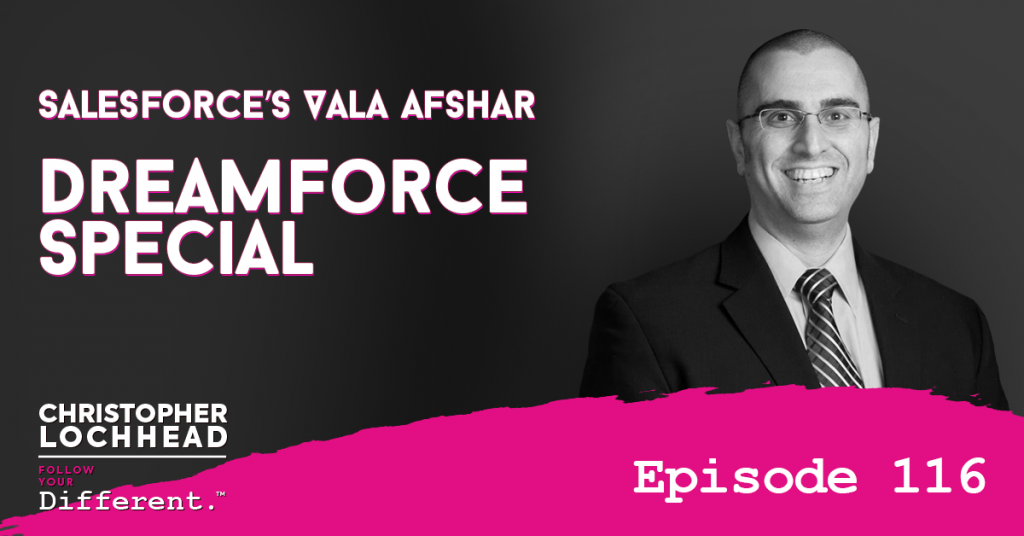
Podcast: Play in new window | Download (Duration: 35:57 — 49.7MB) | Embed
Subscribe: Apple Podcasts | Spotify | Pandora | RSS | More
This special episode is with Chief Digital Evangelist at Salesforce.com Vala Afshar. Coinciding with Dreamforce —Salesforce.com’s annual mega-conference in San Francisco, Vala shares with us what it’s like to be a leader in the digital media age.
He also shares some of the key practices that have made Salesforce #1 on Forbes most innovative companies list.
Social Business Excellence
Vala is the author of The Pursuit of Social Business Excellence. He is also the co-host of DisrupTV and one of the most visible and impactful thought leaders in enterprise tech. On the side, he is a contributing writer at HuffPost, which he claims were one of his ticket for his CMO career.
“I was a CMO for 4 years. Complete impostor syndrome from beginning to end because I never had Marketing experience, I never went to school to study the art and science of Marketing. My CEO called me on a weekend saying ‘on Monday I’m gonna announce that you’re going to be the CMO.” – Vala Afshar
He narrates to Christopher how the energy and confidence that he used to have as an athlete, did not translate to who he has become as a business person. However, he got through this challenge as he had the passion to share information.
From An Introvert to a Keynote Speaker
For an introvert, Vala narrates how he spent 10 years writing codes. He was perfectly happy locked up in a cube, just writing software. He is still amazed with how he opened himself up to people and to be able to share the stage with Christopher in various events.
“Movement is the ultimate status symbol. Movement of information. Again, in my first 40 years, if I read a book or listened to your podcast, I would just consume it and then that’s it, it stayed with me. In the last 5 or 6 years, when I learned something, I try to capture that and share.” – Vala Afshar
Salesforce Innovation
Vala quotes other professionals on why they think Salesforce is successful: it’s because of technology disruption. This disruption is in terms of ‘how do you build an ecosystem, how do you give away your time, money and profit, how do you build a company based on emerging technology and how do you create new business models.
“The 111 Philanthropic model was pretty unique and now about 10,000 companies have adopted that. The subscription model, pay as you go, that’s like the envy of most business..” – Vala Afshar
He also shares about the Salesforce module called V2mom, a mobile compatible app where employees align with the company vision, values, methods, obstacles, and measurements.
To hear more about the best practices of Salesforce.com and leadership advice from Vala Afshar, download and listen to the episode.
Bio:
Vala Afshar is the Chief Digital Evangelist for Salesforce.
Afshar is the author of The Pursuit of Social Business Excellence. Afshar is also the co-host of DisrupTV, a weekly show covering the latest digital business and innovation market trends.
Links:
HuffPost Contributor: Vala Afshar
We hope you enjoyed this episode of Follow Your Different™! Christopher loves hearing from his listeners. Feel free to email him, connect on Facebook, Twitter, Instagram and subscribe on iTunes! Get amazing, different stories on business, marketing, and life. Subscribe to our newsletter The Difference.
115 Heidi Roizen Silicon Valley Legend
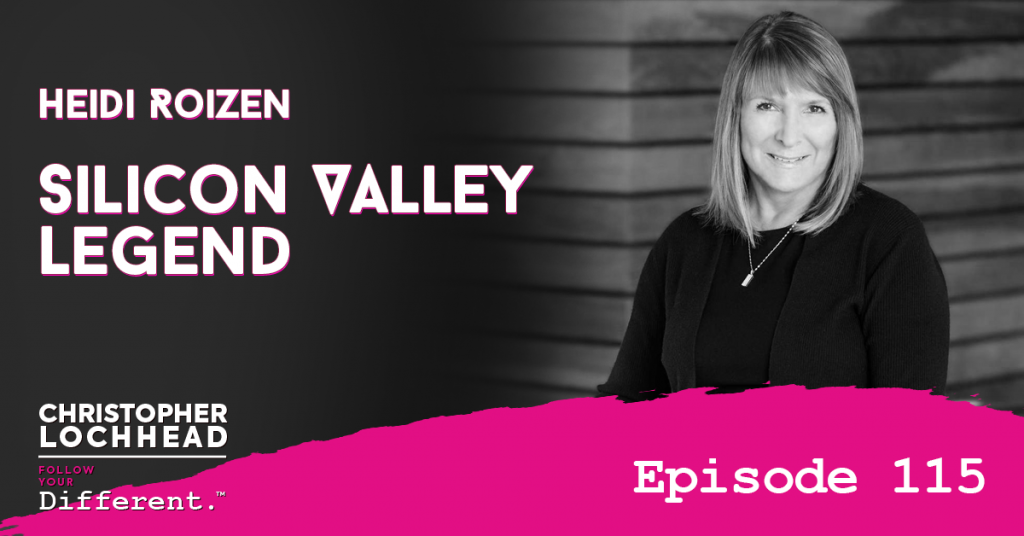
Podcast: Play in new window | Download (Duration: 1:06:50 — 93.1MB) | Embed
Subscribe: Apple Podcasts | Spotify | Pandora | RSS | More
Today’s guest is none other than Silicon Valley Legend, Heidi Roizen. She is an accomplished, Entrepreneur, former head of developer relations at Apple and now, a legendary VC. She shares with us why today is the Golden Era for entrepreneurship, how any company is literally a tech company and more about VC-backed company, Memphis Meats.
Silicon Valley’s Greatest Connector
The Financial Women of San Francisco honored Heidi as Financial Woman of the Year in 2018. She is also dubbed as “Silicon Valley’s Greatest Connector.” She is currently sits on the board of companies such as Zoox, Planet, Memphis Meats, HelixRE and DMGT.
“I talk about the fact that there should be more women entrepreneurs and there should be more women venture capitalists and diversity. Not just gender diversity but other diversity and I try to support that through my actions. I think it’s appropriate given my role in Silicon Valley. If I have an opinion about that, I should be vocal about that.” – Heidi Roizen
Other than these achievements, Heidi is a self-proclaimed animal lover. She adopted several dogs from the shelter, which she fondly shares in her social media.
Golden Era of Entrepreneurship
Heidi describes the market as a seller’s market when it comes to early-stage equity. There are a lot of sources of capital in the market, its very competitive. She enumerates all the positive assets entrepreneurs have in today’s world.
“There’s just so many different avenues for funding. There are so many tech breakthroughs that can be built upon, whether that is networking or processing power, sensors, devices, GPS, next-gen VR technologies, ubiquitous platforms. When you think about the kinds of businesses you can start today for pennies, which costs hundreds of thousands of dollars in the past.” – Heidi Roizen
The only negative she can mention is about competition, as she believes everyone else can also solve many big, interesting problems. Additionally, she mentions why companies nowadays are considered tech companies.
“I do think it’s interesting today is, every company is a technology company, right? For the most part, how they interact with the customers, how they distribute their products, how they garner feedback, how they handle customer service, tech support, logistics, supply chain, internally, HR systems—every company is deep in technology now.” – Heidi Roizen
Memphis Meats. Cell-based Meat
Heidi shares more about Memphis Meats and why she believes there is a huge growth potential for cell-based meat. First, she discusses how meat is inefficient to produce: from breeding to feeding to slaughtering and distribution to markets. Not only does it requires more resources, such as land and water use, it is also highly prone to contamination.
“The great thing about being a venture capitalist is, we don’t have to actually invent this stuff. There are really awesome entrepreneurs that are way smarter than we are who come up with these ideas. We just have to make sure they want to come to talk to us, and that we can validate sufficiently what they are doing through our own research learning.” – Heidi Roizen
To hear more about legendary Silicon Valley stories of Heidi Roizen, download and listen to the episode.
Bio:
Heidi represents the voice of the entrepreneur, having been one herself.
But she also represents the voice of the user, as those are the roots that led her to start a company in the first place.
She is on the boards of directors of Zoox, Planet, Memphis Meats, HelixRE and DMGT (LSE:DMGT.)
After Heidi earned her undergraduate and MBA degrees from Stanford, she co-founded T/Maker, where she served as CEO for over a decade through its acquisition by Deluxe Corporate in 1994. Next, she joined Apple as VP of Worldwide Developer Relations, and from there, Mobius Venture Capital.
She’s been named to the Corporate Board Member’s “Top 50 Women in Tech” list and Hot Topics’ Top 100 Women in Tech.
In 2018, Heidi was named the Financial Woman of the Year by the Financial Women of San Francisco.
She has also earned the Forum for Women Entrepreneurs and Executives Annual Achievement Award, among other accolades.
Heidi currently holds two leadership positions at Stanford University.
She co-leads the Threshold Venture Fellows in the Management Science and Engineering department at Stanford. She is also a member of the advisory council of Stanford’s Institute for Human-Centered Artificial Intelligence.
Links:
Silicon Valley’s Greatest Connector
Financial Women of San Francisco Name Heidi Roizen 2018 Financial Woman of the Year
We hope you enjoyed this episode of Follow Your Different™! Christopher loves hearing from his listeners. Feel free to email him, connect on Facebook, Twitter, Instagram and subscribe on iTunes! Get amazing, different stories on business, marketing, and life. Subscribe to our newsletter The Difference.
114 Think Like Amazon w/ John Rossman
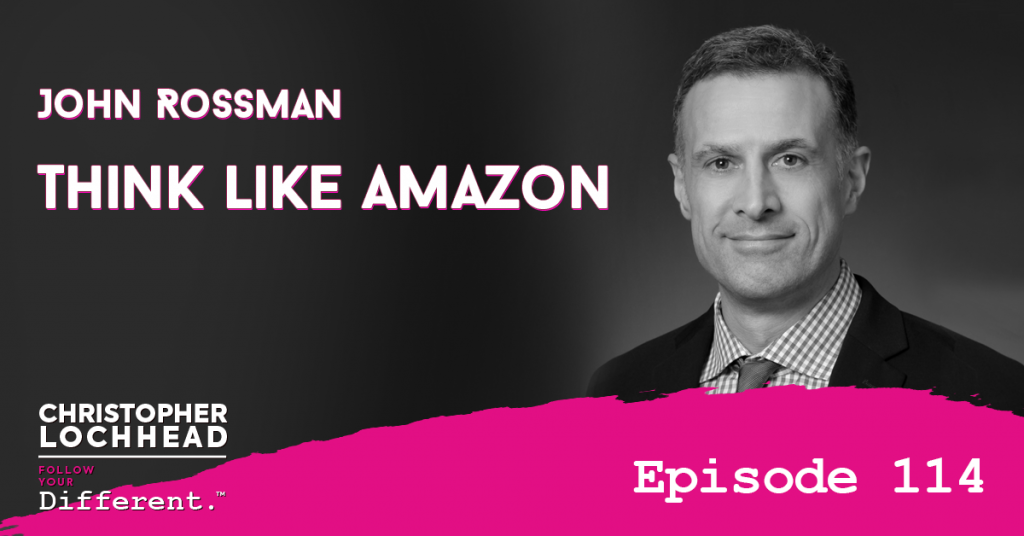
Podcast: Play in new window | Download (Duration: 56:44 — 78.2MB) | Embed
Subscribe: Apple Podcasts | Spotify | Pandora | RSS | More
For the second part of our two-part series on legendary category king companies, we are featuring John Rossman, author of “Think Like Amazon.”
We have a fun, insightful conversation about how Amazon became arguably the most innovative category king in the world and most importantly, how you can learn to think like Amazon in your career.
Digital vs. Traditional
Christopher probes John on his thoughts about the distinction between traditional businesses versus data-driven, digital ones. John shares that other than the technological aspect, he could relate digital businesses to athletic attributes such as speed and agility.
In detail, John said speed is about doing a repetitive motion, extremely well and efficiently. In business terms, that is considered as operational excellence. The second attribute, agility, is the ability to sense and make change happen.
“Part of being digital is about the eternal pursuit of becoming perfect. How do we reduce cycle times? Improve quality, reduce costs? Cut out little pieces of friction from both our customers and employees?” – John Rossman
Embracing New Niches
John cites Amazon’s business strategy in terms of embracing new niches. The other aspect of finding problems, then working on a solution, is the notion of working into the future. He defines the future as a “time and a place for unconstrained thinking.”
“Amazon’s answer to that, their philosophy or their technique is: start with the customer and work backward. ” – John Rossman
When teams are brainstorming, all of these constraints come to the table and they deliberately understand which parts of the solution they are. Afterward, they identify the right mindset, then the right tools and ultimately, the right approach in order to solve the problem.
Architecture is the Business Strategy
Citing some parts of the book, Think Like Amazon, Christopher asks John the idea behind the concept architecture is the business strategy.
“You have to plan forward on how you build things, because the constraints, the flexibility the adaptability on how you build your operations and your technology architecture—will either be a key enabler or key constraint in your ability in going forward.” – John Rossman
In the end, John shares that his whole goal is to give a business person, who is not technology architect, a set of tools and questions that they utilize to be a better partner with their technology expert
To hear more about how digital businesses like Amazon innovate across entire the entire value-chain and John Rossman’s thoughts on how to make wise bets on new business ideas, download and listen to the episode.
Bio:
John Rossman, Digital and Innovation Advisor
Mr. Rossman is an expert at digital business models, operations and organizing programs. He has led engagements on developing innovation processes, Internet of Things strategies, marketplace and API driven platform business models.
He is a sought after speaker on creating a culture of operational excellence and innovation.
Mr. Rossman has worked with clients across various industries, including retail, insurance, education, healthcare, consumer products, industrial products and transportation.
Mr. Rossman’s notable assignments include The Bill and Melinda Gates Foundation, Microsoft, Nordstrom and several of the world’s leading retail and insurance organizations.
Prior to Rossman Partners, John was a Managing Director at Alvarez and Marsal, a performance improvement consulting firm.
Prior to A&M, John was an executive at Amazon.com where he launched the Marketplace business and third party selling platform, and ran the merchant services business.
Links:
We hope you enjoyed this episode of Follow Your Different™! Christopher loves hearing from his listeners. Feel free to email him, connect on Facebook, Twitter, Instagram and subscribe on iTunes! Get amazing, different stories on business, marketing, and life. Subscribe to our newsletter The Difference.
113 Netflix’s Founding CEO Marc Randolph
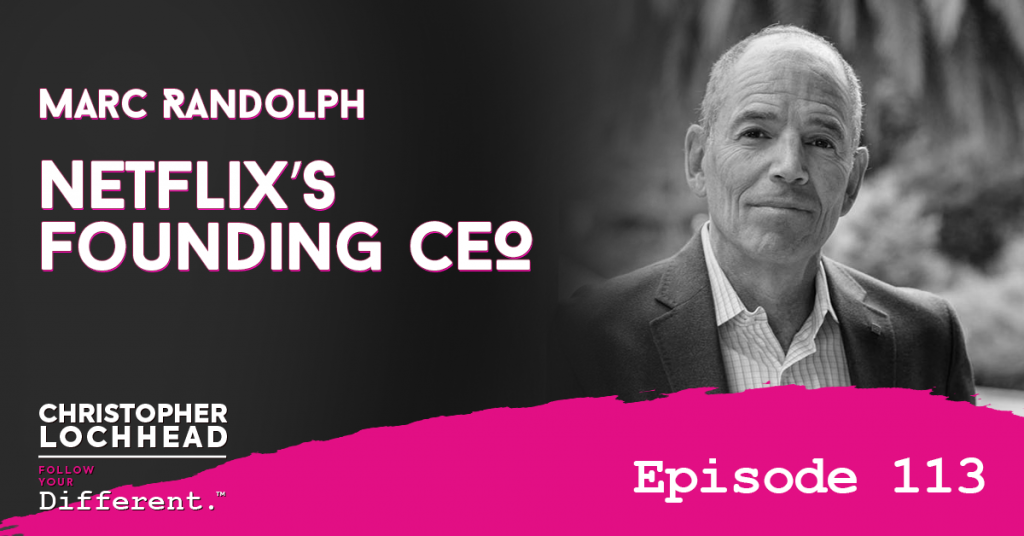
Podcast: Play in new window | Download (Duration: 59:52 — 55.1MB) | Embed
Subscribe: Apple Podcasts | Spotify | Pandora | RSS | More
Category King Marc Randolph, the founding CEO of Netflix, joins us today for a stunning conversation about business and life. He’s got a legendary bestseller out called That Will NEVER Work: The Birth of Netflix and the Amazing Life of an Idea, which he also talks about in this episode.
This is the first in a special two-part series about two of the most legendary category king companies in the world now Netflix and Amazon. Next episode is with John Rossman, author of “Think Like Amazon.”
Book: That Will Never Work
After nearly 16 years after he left Netflix, Marc Randolph talks about his book That Will Never Work. He candidly shares that all those years waiting for the right time to write a book helped him to gain perspective.
First, he says he is wiser business-wise as he worked with a lot of startup companies in the past 16 years. He says he can now identify patterns as they emerge and can safely say he can tell between what works and will not.
“The other cool thing that came out of waiting was, being able to look back and be honest about myself. To really say, ‘I don’t care how it’s perceived. I want this to be a real true portrayal of what it’s like in a startup.’” – Marc Randolph
Remembering Moments, Not Details
Marc also shares that he tried to get it right, but since he is writing about events that took place around 20 years ago, he shares how ridiculous it would be to remember every line and dialogue that he featured in the book.
He also shares he focused on remembering the moments, especially the mood of the conversations that he had. Christopher even remarked a portion of the book where Marc wrote: “This is a memoir, not a documentary. This is kind of how I remember things. I’m not trying to get it 100% right.”
Everything is Intermingled
Christopher chides with Marc on the part where he mentions that personal life intermingles with business life. Marc stressed the importance of devoting time for spouses and kids, as this is a realistic portrayal of a startup.
“I think part of being successful is having balance in your life. I preach about culture is not about what you say, it’s what you do. So I wanted to show how we did it, how do you really have balance in your life.” – Marc Randolph
To hear more about life and business lessons from Netflix Founding CEO Marc Randolph, download and listen to the episode.
Bio:
Marc Randolph is a veteran Silicon Valley entrepreneur, advisor, and investor. As co-founder and founding CEO of Netflix, he laid much of the groundwork for a service that’s grown to 150 million subscribers and fundamentally altered how the world experiences media.
He also served on the Netflix board of directors until retiring from the company in 2003.
Marc’s career as an entrepreneur spans four decades.
He’s founded or co-founded six other successful startups, mentored hundreds of early-stage entrepreneurs, and as an investor has helped seed dozens of successful tech ventures (and just as many unsuccessful ones).
Most recently, he co-founded analytics software company Looker Data Sciences, which was recently purchased by Google for $2.6 billion.
Outside of the tech and startup world, Marc sits on the boards of Chubbies Shorts, Augment Technologies, the environmental advocacy group 1% For The Planet, and the National Outdoor Leadership School (NOLS), which he’s been involved with for most of his life.
A resident of Santa Cruz, California, Marc travels and speaks all over the world, and still probably manages to go surfing more than you do.
Links:
We hope you enjoyed this episode of Follow Your Different™! Christopher loves hearing from his listeners. Feel free to email him, connect on Facebook, Twitter, Instagram and subscribe on iTunes! Get amazing, different stories on business, marketing, and life. Subscribe to our newsletter The Difference.

